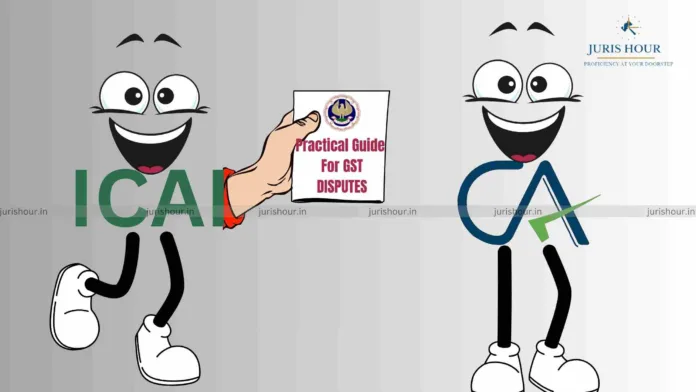The Institute of Chartered Accountants of India (ICAI) has issued the practical guide on GST disputes stating that the Chartered Accountants (CAs) are expanding their professional domain from traditional income tax roles to taking the lead in indirect tax representation, particularly under the Goods and Services Tax (GST) regime.
The Goods and Services Tax, introduced as a unified tax replacing multiple levies, has led to a rise in procedural complexity and legal disputes. Recognizing this, the Institute of Chartered Accountants of India (ICAI) has launched several initiatives, including a comprehensive certification programme in GST, to enable CAs to effectively engage in audit, compliance, and litigation under the indirect tax framework.
According to ICAI’s recently published Practical Guide to GST Disputes, CAs are now well-positioned to represent clients in a wide array of tax-related matters—ranging from departmental audits and investigations to adjudication and appellate proceedings before tribunals.
“CAs are not only assisting clients with compliance but also advising on litigation strategies, drafting replies to Show Cause Notices (SCNs), and representing before adjudication and appellate authorities,” states the guide. “Given their deep understanding of business operations and accounting practices, they are uniquely suited to unravel discrepancies and defend tax positions effectively.”
Section 116 of the CGST Act authorizes CAs holding valid certificates of practice to act as “authorised representatives” in GST matters up to the Appellate Tribunal level. Although they cannot represent clients in High Courts or the Supreme Court, CAs play a critical role in supporting legal counsel with factual and evidentiary documentation.
The ICAI emphasized the importance of ethics, technological competence, and continuous legal education for professionals engaging in GST disputes. CAs are encouraged to maintain independence, avoid conflicts of interest, and provide unbiased professional advice—even if it means advising clients to accept legitimate tax liabilities.
The growing scope of GST litigation also requires professionals to adapt to the digitized legal infrastructure. “Failing to keep pace with technology can impair one’s effectiveness in representation,” the guide notes, underlining the need for knowledge of digital evidence protocols and e-filing mechanisms.
As the GST Appellate Tribunal (GSTAT) prepares to become operational nationwide, the ICAI’s proactive steps appear timely. The profession is witnessing a paradigm shift where representation and litigation services under GST are becoming core offerings alongside audit and compliance functions.
This evolution signals a broader transformation in the role of CAs—from being compliance facilitators to becoming strategic defenders in India’s dynamic tax regime.

